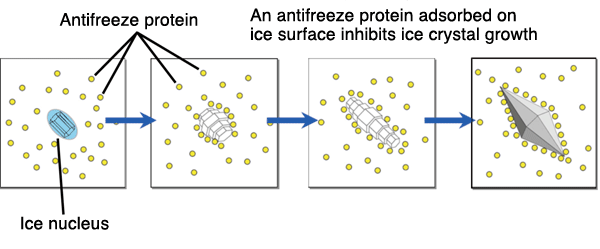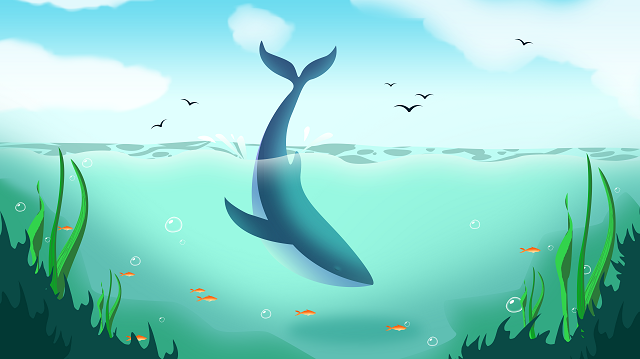Think about this: The freezing point of pure water is 0°C , and our cells are made up of 70% water, then how do fish in the arctic and Antarctic regions not end up freezing, but have a thriving life in the sub zero temperature regions? Well, there are multiple factors involved, let us have a look at them.
The freezing point of water
We know that the freezing point of pure water is 0°C. However, this freezing point depends on multiple factors including, density, salinity and atmospheric pressure.
You may have noticed that in lakes, the top layer freezes first, whereas the water down below is still liquid and the fish and other aquatic life survives in them. But why don’t the lower layers of water freeze?
Anomalous expansion
Unlike other liquids that expand when heated, water doesn’t expand till it is heated above 4°C . At 4°C water has the least volume and maximum density (not 0°C as you may be likely to think). This property of water is called “Anomalous expansion”.
Freezing of water in a lake
When the surface water reaches 4°C, it attains maximum density and hence sinks down and displaces the lower layers to the surface. When the newly emerged layers also reach 4°C, they sink down and displace the layers below. When the temperature reaches 0°C, the surface water freezes into ice, whereas, the bottom layers are still at 4°C and in liquid state. During this process, oxygen gets trapped below the surface, so the aquatic creatures still have an oxygen supply.
In the oceans, as we go deeper, the temperature of the water drops, and the oxygen content also decreases. In such cases, the organisms adapt to their surroundings and have slower metabolic rates that allow them to survive the extreme conditions.
Anti-Freeze Proteins (AFPs) or Ice Binding Proteins (IBPs)
The freezing point of fish blood is about -0.9°C. It is possible for the surrounding regions in the arctic and Antarctic regions to go much below that temperature. It has been found that special proteins called Anti-Freeze Proteins or Ice Restructuring Proteins are found in some organisms that prevent the formation of ice crystals in the fish blood. ( fungi, microalgae, crustaceans fish)

During the process of ice formation, a tiny ice crystal forms which later grows rapidly and leads to all of the surrounding water turning into ice. Anti-Freeze Proteins get adsorbed on to the surface of the tiny ice crystal and do not allow it grow further, thus inhibiting the freezing of the blood or the cells of the organisms.
Thermal Hysteresis
Now that we know that there are special proteins in fishes that prevent their, freezing, one may ask, will they freeze if we put them in the refrigerator? Yes, they will freeze. the antifreeze proteins have a limit till where they can prevent freezing, Thermal hysteresis is the difference between the freezing and melting point of a liquid. Anti Freeze proteins increase the thermal hysteresis, but not beyond a certain point. If the refrigerator is set at -20°C, the fish will freeze. Moreover, by the time the fish reach your refrigerator, they will most probably be dead and the proteins will be inactive.
Application of AFPs
Researchers are now looking to use the properties of AFPs for human welfare, by using them as cryoprotectants (i.e protection from cold). It is being tested out for the storage of various biological tissues.
Conclusion
In Conclusion, Anti-Freeze Proteins (AFPs) or Ice Binding Proteins (IBPs) in Fish, The Freezing Point of Water and it’s Anomalous Expansion prevent fish from freezing in ice cold water.
References:
https://www.ausableriver.org/blog/look-under-ice-winter-lake-ecology
https://phys.org/news/2018-03-strange-behavior.html
Kim, H. J., Lee, J. H., Hur, Y. B., Lee, C. W., Park, S. H., & Koo, B. W. (2017). Marine antifreeze proteins: structure, function, and application to cryopreservation as a potential cryoprotectant. Marine drugs, 15(2), 27.
Get stories like this one in your inbox: Sign up for our email and Subscribe Now To Get The Most Anticipated Edition Of Starry Stories Magazine For Free.
Photos, Vector Graphics & Illustrations Credits
Pixabay: 1 million+ Stunning Free Images to Use Anywhere
Pngtree: Millions of PNG Images, Backgrounds and Vectors for Free …
Read more Articles from Life Sciences
1. Read about What are Life Sciences and Careers in Life Sciences
2. Read the Most Searched Google Question and Answers about Tardigrades! – What do tardigrades eat on the moon? Can tardigrades die? Are Tardigrades dangerous?
3. Read about the The Secret Lives of Tardigrades
4. Read the Top 10 Interesting Facts about Tardigrades
About Author
Saunri Dhodi Lobo is pursuing M.Sc in Life Sciences with specialization in Neurobiology. Her interests include writing poetry, going for nature walks and swimming. Currently she is involved in research on Alzheimer’s Disease in fruit flies.
Read all Articles by Saunri Dhodi Lobo


Very fine way of teaching things.. just awesome
Hey, the content is good but you should have also mentioned why scientists are interested in AFPs at this point of time, because we already have good gear to protect ourselves in -20 degree temperatures.
Impressive article but the information is clear enough if hystersis graph is shown related to temperatures with freezing point and melting point .
Interesting article with good info.
1. Would be better to get another article related to ice binding proteins with pictorial representation other than in the above article
2. Need info about hystersis (we have seen this related magnetism )
3.how AFPs can be realated to human nature ? Could you please explain in clear .
Questioning everything and finding right answers to with scientific evidence is how hope on science grows. To many unknown mysterious questions, science is the only answer. Open ending an answer will make us involve in science.
Good writing coupled with scientific approach made this article very good.
Keep up the good work. Waiting to hear more stories.
Thank you very much Suresh. We would love to publish more such wonderful stories with your support.
Very crisp & clear.
Thank you very much Akshay. We will work on more wonderful stories to make science crisp and clear.
Great content! Just loved how u explained it so deep yet clear.
Good content,
When I started reading this, I am feeling like I know this topic, but not. you really added the detailed content regarding the whole process of freezing.
It’s interesting to know about Anti-Freeze Proteins in fishes.
Thank you very much Jasmine for taking interest in our article. We would love to publish more such wonderful stories with your support. Keeping following us.
Nice article. Thanks you for making such…
Very nice intersting
Amazing staff
A very good approach, it is very easy to read and to understand the concept for any one.
Keep going in the same way.
Who is the article